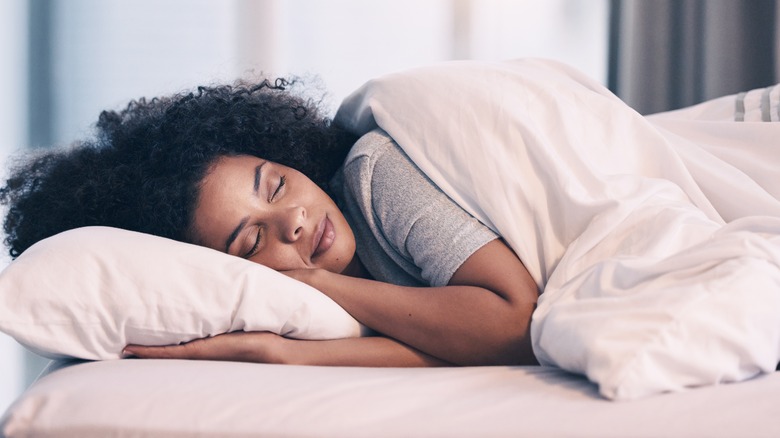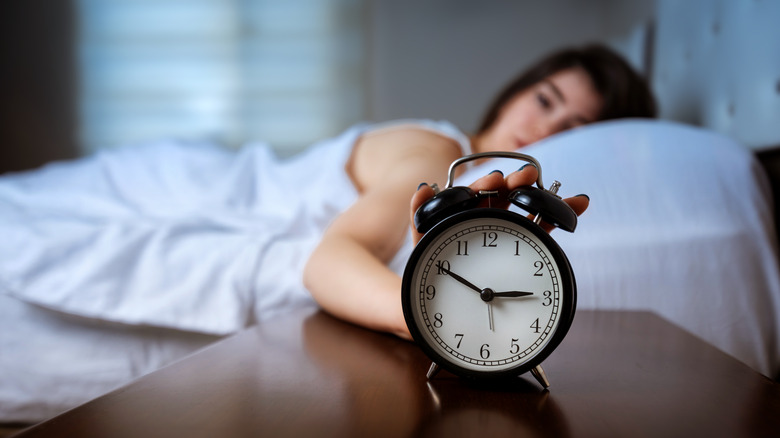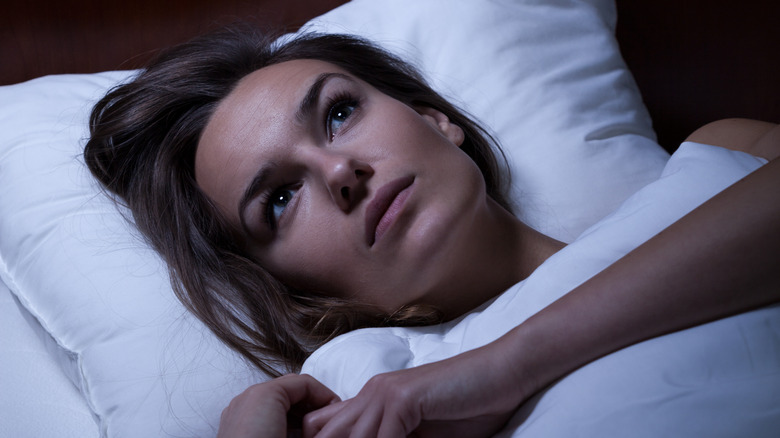Do This With Your Eyes To Fall Asleep In Record Time
For some people, the thought of winding down for bed can be riddled with anxiety. Lying awake in bed, knowing you should be asleep by now if you want to get your recommended 7-9 hours of sleep, but painfully realizing with every passing minute of wakefulness that this may not happen, can be distressing. So much so that, if it's something that happens often, you might even start dreading this time of night when you're actively willing yourself to fall asleep.
If this sounds like you, you may want to try a sleep tip that has roots in psychological therapy to treat phobias and anxiety — called "paradoxical intention." Despite resurfacing on TikTok as a sleep hack, paradoxical intention has been used in the treatment of insomnia since the 1970s. It involves actively trying to keep your eyes open while lying in bed, instead of willing yourself to sleep. When used in the context of phobias, paradoxical intention is about facing your fears until eventually the fear and anxiety surrounding them fade away. When practiced in the context of getting quality sleep, it's about focusing on doing the one thing you don't want to be doing at that time — staying awake — instead of unsuccessfully trying to fall asleep.
"Sleep is primarily an involuntary process, and therefore, by attempting to control the sleep process, you usually interfere with it. Essentially, you can't get sleep; you can only ever fall asleep," explained a professor of sleep medicine in the Nuffield Department of Clinical Neurosciences, University of Oxford, Colin Espie (via BBC Science Focus).
Why paradoxical intention could help with sleep troubles
The basic premise with paradoxical intention is to remove the anxiety surrounding falling asleep by focusing instead on the act of staying awake. When your anxiety diminishes and your mind and body become calmer, you could potentially fall asleep in record time. It can be likened to removing the "performance anxiety" related to sleep so you sleep better. In fact, according to a 2021 meta-analysis published in the Journal of Sleep Research, paradoxical intention significantly reduced the performance anxiety people with insomnia felt.
"If we fear something, we do everything we can to try and avoid it — and while we're doing these things, we keep looking over our shoulder to see if the thing we fear is going to happen. As a result, we feel more anxious, and the thing we're trying to avoid ends up happening. It's a vicious cycle," explained a sleep scientist at the sleep therapy program Somnia, Dr. Katharina Lederle (via Glamour).
Sleep experts warn, however, that paradoxical intention may not be appropriate for everyone. You shouldn't turn to it if you've been diagnosed with a different sleep disorder, like obstructive sleep apnea, or if you don't have trouble getting to sleep. It's only recommended for anxious sleepers and people who have insomnia. That being said, here's how you can tackle sleep-related anxiety by keeping your eyes open.
How to try paradoxical intention to fall asleep
With this sleep tip, you want to be lying down in bed comfortably with your eyes open. Tell yourself things like, "I'm going to try and stay awake for a few more minutes," and "I'm not sleeping." The idea is to resist closing your eyes for as long as you can. However, sleep specialists advise that you not attach more meaning than you need to this sleep practice. It shouldn't become about overthinking trying to be awake or fighting the urge to sleep. When sleep does come naturally, you're meant to embrace it.
There are some other tips for before and after getting in bed as well, like following your regular sleep hygiene routine, getting into bed when you're actually tired, adopting a mindset of not having any expectations, and avoiding stimulating activities right before bed or while in bed (think scrolling on your phone or talking to someone).
Speaking of stimulating activities, psychologist Mark Travers (via Forbes) has a slightly different take on what to do before trying to fall asleep. Since being awake when you should be sleeping is the cause of sleep-related anxiety, he recommends making use of that time positively, by doing slightly stimulating yet boring activities like daydreaming of pleasant things or organizing your bookshelf by alphabet. "These tasks can help shift your focus away from the pressure to sleep and may even make you feel drowsy, helping you to fall asleep more naturally," explained the expert.



